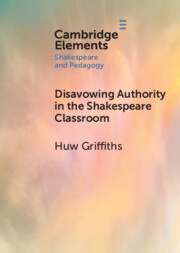Element contents
Disavowing Authority in the Shakespeare Classroom
Published online by Cambridge University Press: 02 April 2024
Summary
- Type
- Element
- Information
- Online ISBN: 9781108953115Publisher: Cambridge University PressPrint publication: 25 April 2024
Bibliography
- 5
- Cited by

